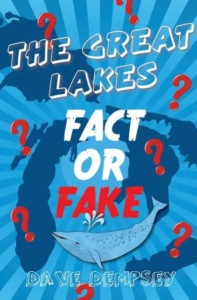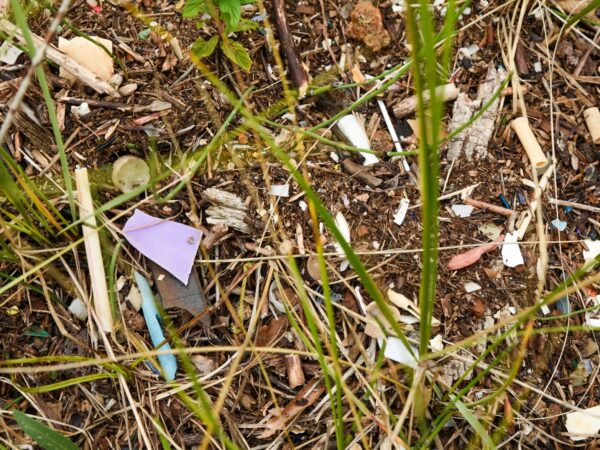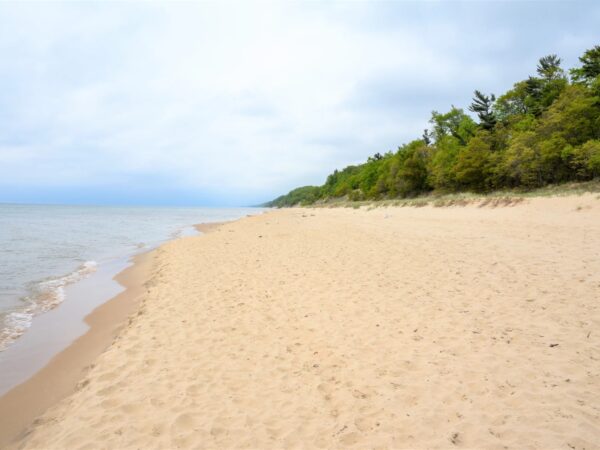
What is President Abraham Lincoln’s connection to a current vexing Great Lakes threat? Traveling south to Canada, right? And why would France go to court over a Great Lakes issue?
Those are some of the questions Traverse City author Dave Dempsey asks in his latest book, The Great Lakes: Fact or Fake.
A prolific author, Dempsey is best known for his profile of former Michigan Gov. William Milliken and two editions of Great Lakes for Sale where he chronicles the threat of diverting Great Lakes water elsewhere.
In Fact or Fake, Dempsey takes a different literary path delving into little known facts, or not, about the Great Lakes. The topics, 41 of them, come in rapid fire succession and can have bizarre titles like, “Housewives and Pollution” or simply, “Dracula.” It’s then up to the reader to decide if the story is fact or fake. The result is a serious work that can be whimsical, challenging, informative and is an easy read.
Dempsey is a veteran Great Lakes policy expert who served on the U.S. and Canada International Joint Commission during the administration of President Barack Obama. He is currently a policy adviser for FLOW, a legal and policy advocacy non-profit.
Great Lakes Now contributor Gary Wilson recently talked to Dempsey about the book, and took the opportunity to query him about a recent development related to a diversion of Great Lakes water.
The interview was recorded, transcribed and edited for clarity and length.
Great Lakes Now: In the introduction to Fact or Fake you say that rather than “lecturing” people about the Great Lakes, you wanted to “challenge and entertain” them. After decades of writing weighty books about policy and people, why the shift?
Dave Dempsey: Partly because the weighty approach isn’t working. “Weighty” gets nice reviews and attention from a small sub-community of the Great Lakes and doesn’t really sink through to general readers. That was the main reason, plus I’m a little bored with my own ponderous tomes. It’s time to lighten it up a bit and challenge people to learn. The primary audience is not really the Great Lakes community, it’s about visitors and tourists who aren’t from this region who probably don’t know much about the Great Lakes.
GLN: The book is a mix of science, geography, culture, history, obscure events and more. The short topic titles like “Dracula” and “French Wreck” are instant attention getters. Among the characters, you include President Abraham Lincoln and the “King of the Lakes.” Was it your intent to have such eclectic content or did that evolve?

The Great Lakes: Fact or Fake. (Photo courtesy of Dave Dempsey)
DD: It was my intent. A focus on pollution issues, while important, is a Johnny one-note thing. To get people engrossed in the Great Lakes you need to provide various perspectives on the history, geography, wildlife and fish. That’s a path to draw people in.
GLN: “King of the Great Lakes” takes place on Beaver Island in Lake Michigan and the story contains serious tones. There’s a polygamy issue and charges of treason. Were you apprehensive about including that vignette?
DD: I wouldn’t say apprehensive but I did think a lot about it. I recognize the sensitivities but it needed to be in the book because it’s such a bizarre and unique part of the history of the Great Lakes, especially the social and political history. This man was not only a self-proclaimed king he was a Michigan legislator. It was an interesting story and a way of introducing people to another aspect of Great Lakes history.
GLN: I have a personal connection to the “South to Canada” question because growing up in Detroit, my father stumped me with it. Is it your hope that readers are able to personally connect to the topics?
DD: Yes, I hope there are stories in the lives and memories of readers that will relate to particular chapters. I didn’t include it in the book but we’ve previously discussed the freighter that overturned in the Detroit River in 1962. Stories like that stick with people. The event was a big attraction.
GLN: Do you have a favorite topic or question from the book? Perhaps one that caused you to challenge your preconceptions?
DD: I didn’t know as much about microplastics as I know now and I’m pretty alarmed. It’s one of the more serious selections in the book. The fact that these particles are floating inside of us and we are eating them is scary. I didn’t know much about the African Great Lakes and didn’t see them as a rival to the American Great Lakes. But by size alone they really are. That was a lesson.
GLN: In the Afterword, you revert to some of the environmental issues the lakes continue to face including lingering toxic substances, invasive species and more. Since 2010, the federal government has invested approaching $5 billion in restoring the Great Lakes and advocates say more is needed. What’s their status?
DD: In the human mind, they’re much more interesting and the sense of wonder has grown as more writers, poets and singers reflect on the Great Lakes. As for the lakes themselves, they’re inexplicably worse over time. I’ve explored that topic once previously and it’s been on my mind a lot lately.
To be honest, the focus on getting more federal money for the Great Lakes, while the money has done a lot of good, is somewhat self-defeating because it’s made the environmental community and the political representatives of this region almost neglect other issues. This money being such a focus, a lot of other things aren’t getting the attention they should. It’s a mixed blessing to get $5 billion. It’s a good thing but not uniformly. What we get are these prefabricated press releases every year about how the Great Lakes need more money and all the cliches.
GLN: You’ve written two books, Great Lakes for Sale and the 2021 updated version with the same name, about the perils of treating water as a commodity. We’d be remiss if we didn’t ask about Chicago’s recent announcement of a sale of water to Joliet, Illinois, which is well outside the Great Lakes basin. But the transaction is allowed by a decades-old Supreme Court decree. Is this an indicator of things to come? Treating water as an asset to generate revenue?
DD: I worry that it is. It’s astonishing that Chicago has been able to treat their allotment of Great Lakes water as an entitlement. Instead of returning the amount saved by conservation back to the lake, they take that increment and sell it, to balance the budget I assume. That’s dangerous, we have to operate under the assumption that there’s not a drop to spare. To the extent that a city like Chicago has had a blessing from the Supreme Court to take water, it’s always been my assumption that it was temporary or at least limited to its own needs.
GLN: You’re arguably the most prolific author on the Great Lakes but recently said you’re shifting your writing emphasis away from environmental issues. What comes next?
DD: I think non-environmental writing, a focus more on biographies. My brother and I are working on an update of Ink Trails, a series on Michigan authors.
Beyond that I have a couple biographies in process. One is about a character, Perry Bullard, who was a state legislator from Michigan. An ultra-Liberal who was notorious because in his first term he smoked dope, probably at the Ann Arbor Hash Bash. He turned out to be a prolific legislator. His legislative career tracks the trajectory of liberalism beginning in the 1970s to the 1990s.
Catch more news at Great Lakes Now:
Former U.N. adviser warns on water futures trading, elevates water crisis to level of climate
Environmental justice expert questions Michigan’s subsidies for electric vehicles
Featured Image: Photo courtesy of Dave Dempsey




